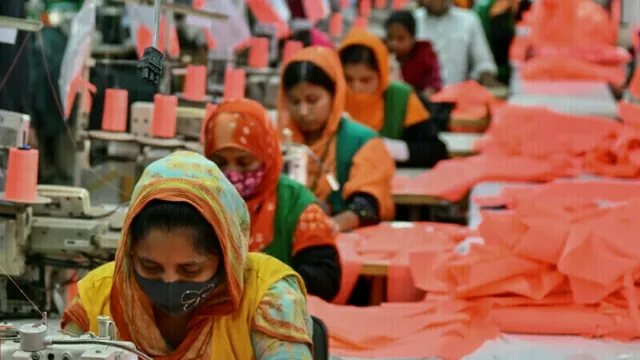
Bangladesh faces grave challenges as US buyers halt orders
2025-04-08 08:01- Bangladesh has faced a significant tariff increase of 37% on its cotton and polyester exports to the United States, affecting its key garment industry.
- The interim government is urgently seeking a pause in these tariffs, reflecting concerns over a potential economic impact on the nation's exports.
- Industry leaders warn that the combination of order halts and increased tariffs could lead to a massive blow to the garment manufacturing sector.
Express your sentiment!
Insights
Bangladesh's interim leader Muhammad Yunus convened an emergency meeting in Dhaka following alarming reports of US buyers halting garment orders from the country. This decision was prompted by newly imposed tariffs by the US government, which have drastically increased the duties on Bangladesh's cotton and polyester products from 16% and 32% to 37%. The changes threaten the country's vital garment industry, which is responsible for approximately 80% of Bangladesh’s exports and was just beginning to recover from disruptions caused by last year’s revolution. Sources indicate that US President Trump initiated these tariffs in response to trade imbalances and has since received a letter from Yunus requesting a three-month suspension of the tariff measures. In the letter, Yunus expressed Bangladesh’s intention to enhance exports of US commodities like cotton, wheat, corn, and soybean. The tariffs might cause American importers to seek more cost-competitive alternatives, prompting manufacturers in Bangladesh to express concern regarding future engagements in the US market. Bangladesh Garment Manufacturers and Exporters Association (BGMEA) representative Mohammad Mushfiqur Rahman revealed the immediate impact, stating that he had already received communication to halt a shipment of leather goods specifically for a US buyer worth $300,000. Similarly, another company executive stated his buyer requested a $150,000 shipment halt. These examples reflect a broader trend where buyers are pressuring suppliers to either incur the additional costs due to tariffs or adjust their prices downwards, which could jeopardize the sustainability of their operations. The government’s response emphasizes a commitment to negotiate with the US administration and to take necessary steps to alleviate the situation. However, concerns remain about the industry's capacity to withstand such significant shocks, given that manufacturers have voiced fears that buyers may turn to other sourcing countries due to these tariff changes. The urgency of this situation has led to calls for patience from both the government and industry leaders as they strive to find a resolution that mitigates the adverse effects of these policy changes.
Contexts
The textile industry in Bangladesh has played a crucial role in the country's economic development since its independence in 1971. It has transformed Bangladesh into one of the world's leading garment exporters, contributing significantly to the nation's GDP and employing millions of workers, particularly women. However, the industry has faced numerous challenges over the years, including labor rights issues, safety concerns, and environmental sustainability. These challenges have prompted both national and international stakeholders to call for reforms to create a more responsible and sustainable textile sector. One of the most pressing issues in the textile industry has been labor rights violations, which have drawn global attention. Workers in many factories often endure poor working conditions, long hours, and inadequate wages. High-profile incidents, such as the Rana Plaza collapse in 2013, highlighted the dire state of safety regulations in the industry, resulting in an international outcry for improved labor practices. Despite some progress through initiatives like the Accord on Fire and Building Safety, significant challenges remain in ensuring that all factories adhere to safe working standards and respect workers' rights. In addition to labor issues, environmental concerns have increasingly come to the forefront. The textile industry is known to have a heavy ecological footprint, contributing to pollution and excessive water usage. Many dyeing processes release toxic chemicals into water bodies, severely impacting local communities and ecosystems. As global consumers become more environmentally conscious, there is increasing pressure on the industry to adopt sustainable practices. Some companies have begun investing in cleaner technologies and more sustainable sourcing practices, but a large-scale shift is necessary for lasting change. Looking ahead, the Bangladesh textile industry must navigate these challenges by embracing innovation and prioritizing ethical practices. Engaging workers in decision-making processes, enhancing governmental oversight, and fostering collaborations with international organizations can facilitate the transition towards a more sustainable industry. Investments in technology that reduce environmental impact while improving efficiency would benefit manufacturers and resonate with an evolving consumer base focused on sustainability. Ultimately, addressing these historical challenges head-on will be vital for the long-term viability and growth of the textile sector in Bangladesh.